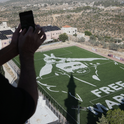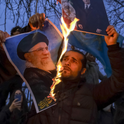Often, my first reaction to news coming out of Israel and Palestine is a narcissistic one—making it all about me. When I hear about the latest horror in Gaza, I wonder: “Is now the time to speak out?” When I see settlers rampaging through West Bank villages, I wonder: “Do I say something now?” And when Israel struck Iran on Friday 13th June, I immediately worried: “What should I say about this?”
This anxious sense of an imperative to speak is a reflection of the temptations of an easily accessible public sphere. Like anyone else, I can instantly emote and express my precious thoughts on any number of platforms. Many of the people who populate my feeds are constantly reinforcing the expectation that when one sees something unjust, oppressive or abusive, speaking out is the only moral reaction. From whatever perspective, my timelines are full of tributes, denunciations, expressions of solidarity and J'accusing. Social media transforms us into issuers of press releases on behalf of ourselves. There is no issue more likely to provoke public statements than Israel/Palestine/Gaza, and now war with Iran has added a new layer of outrage and fear to this combustible discourse.
So should I speak out? It's almost as though I have the question the wrong way round: why would I not speak out? After all, what is happening in Gaza is intolerable, the suffering horrific. Adding conflict with Iran to the situation is terrifying.
I almost have spoken out on Gaza on many occasions since 7th October 2023. And I have even posted tangentially on the subject. My reluctance to go further is partially self-interested, since I occupy a very delicate professional and personal position which requires me to maintain good relations both in the mainstream (and pro-Israel) Jewish world and in other worlds, Jewish and non-Jewish, where pro-Palestinian politics is normative. But it’s also because the desire to speak out is somehow polluted by the constant pressure to do so. If I did speak out, how would I even know I was being sincere?
There is a terrible irony baked into Israel-Palestine discourse. Pro-Palestinian activists enjoin us to “never stop speaking about Gaza”, as the slogan goes. We are told that silence—or even mealy-mouthed criticism—is “complicity”. In many kinds of pro-Israel activism, meanwhile, silence is also the enemy; failure to mention the hostages enough or to denounce antisemitism enough is also seen as a form of complicity. Yet such injunctions end up modelling normative discourses that anyone who is minded to can simply recite by rote, regardless of what they actually feel. Depending on the subculture you wish to inhabit, speaking becomes a kind of price of entry.
In fact, sincerity can be a disadvantage in entering the fraught terrain of discourse about Israel and Palestine. It was painfully apparent in both Dawn French and Gary Lineker’s recent attempts to speak out for Gaza that they lacked the cynicism required to avoid the bear-traps they were setting for themselves. All these public figures had was a feeling that they needed to speak, together with an incoherent set of models for the sort of things one should say. Maybe they thought their good intentions were sufficient, but in a public discourse so dominated by performativity and tests of political purity, good intentions are rarely enough.
And some people are simply better at discourse regurgitation than others. Woe betide you if you speak out the wrong way. You can’t speak out for Gaza if you don’t call it genocide. You can’t speak out for Israel if you don’t namecheck 7th October. No one is looking for approximate fellow-travellers right now; it’s a time for reciters of catechisms.
One of the side-effects of this drive to conformity is that those who take risks are indistinguishable from those who take the path of least resistance. There’s a quote from Greta Thunberg that has been circulated widely in recent weeks: “Every single one of us has a moral obligation to do everything we can to fight for a free Palestine.” Ironically, the effect of this quote has been that Thunberg’s significant personal bravery becomes equivalent to the far more variable levels of courage of simply talking about Palestine online.
The counterargument is that, during an emergency, individual sincerity is less important than ensuring a strong collective voice. This assumes a lot about the power of speaking out to change the world. The idea that this is an essential part of mass politics is perhaps a corollary of trauma and guilt arising from history. We now know of too many examples of genocides carried out under conditions of secrecy, of child abusers protected by conspiracies of silence. Yet we should also recognise that there are also histories of mass movements that achieved nothing, of martyrs who spoke out and were ignored. Besides, the ease with which we can speak out today mocks the voice’s pretensions to power. Posting Pastor Niemöller’s “First they came for…” on Facebook doesn’t make you Pastor Niemöller.
It might seem that the alternative to the pretensions of voice is to devote just as much effort to listening as we do to speaking out, perhaps by building “safe spaces” to do so. This quasi-therapeutic approach may merely reinforce the assumption that our voices matter—and to such an extent that the calculation that political struggle requires becomes irrelevant. Somehow, if enough people say the same thing at the same time in the same way, the world will magically change,
The power of the voice is not a given, it is contingent on the circumstances. Part of the impact of social media has been to erode our ability to calculate that contingency. Social media deludes us into thinking that discourse can be a level playing field; one where our voices can combat other voices and maybe even prevail. Anyone with the right amount of persistence can become an online influencer; that possibility can mean we ignore the ways in which power and influence often work silently, with no public voice at all. In principle and depending on who is speaking and in what context, speaking out can be a brave and transformative act. However, the chances for that voice to cut through are much lower now that anyone can set themselves up as the one who speaks truth to power. At every moment, countless voices clamour to be heard in a chorus of narcissism.
So, is now the time for me to speak out? And does it matter if I do, or if I don’t?
For the moment, I am caught up not so much in the horns of a dilemma as in an absurdity. Speaking out would likely be personally consequential; it might radically change my career, my personal circumstances and my friendships. Yet given my modest public profile, my speaking out will likely be politically inconsequential. It is the absurdity of that gap that is stopping me from entering the fray. And at the same time, what nags away at me is that, by thinking about speaking out purely in terms of impact, I am getting it completely wrong: Such an instrumental way of thinking about the voice ignores the possibility that the public and moral voice might have value in other respects.
Somehow, we have to recover the power of the voice. That may well mean rediscovering the value of scarcity, of the voice crying out in the wilderness. And that is likely to mean rediscovering restraint and strategy; picking the most apposite time for speaking out, so that we might be heard.










